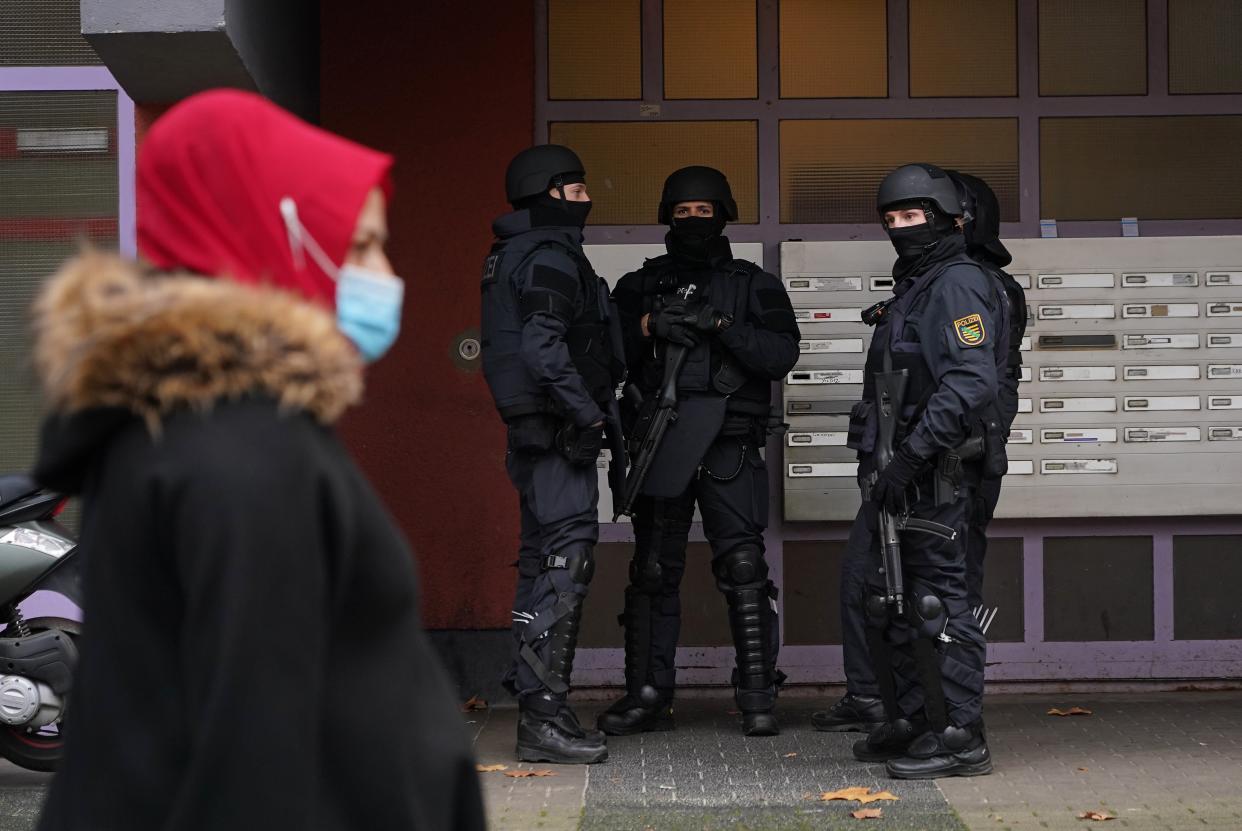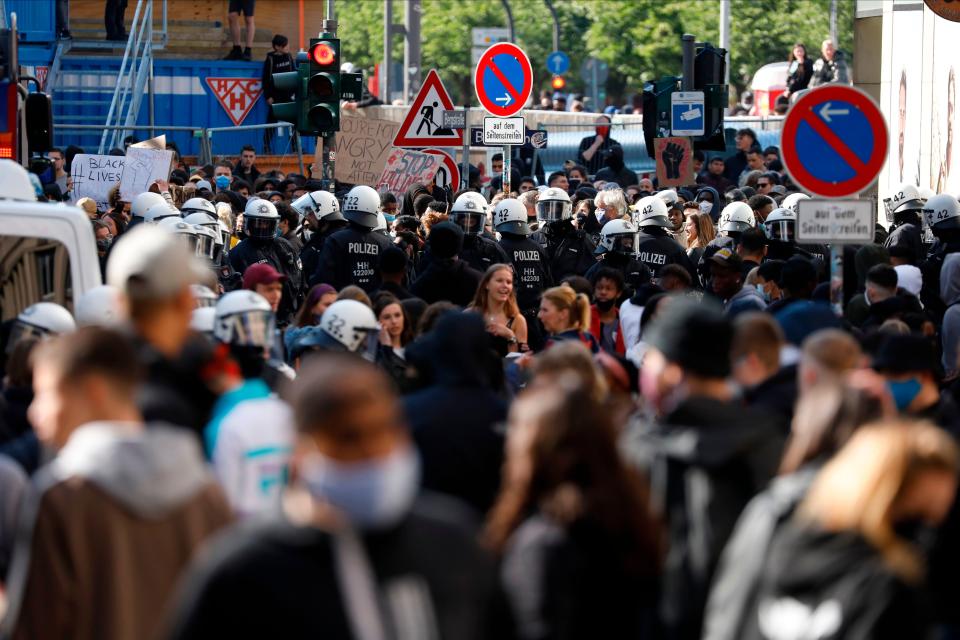‘Learn to shoot – the refugees are coming’: Germany’s police struggle to tackle racism and the far right

Heavily-armed police standing outside an apartment building in Kreuzberg district
(Getty)As Simon began to pull the trigger of his 9mm handgun, his weapons trainer told the class to imagine a new target.
“We have to learn how to shoot well now we have all these refugees coming,” he laughed.
Simon was one of about 30 people, yet looking around, there didn’t seem to be much of a reaction. A few sniggers here and there, barely an eye roll.
He was training in Leipzig, Saxony, in east Germany for a couple of months, spurred to join by his sense of duty to fellow citizens. It had been his dream job.
All he needed to do was keep quiet, learn the ropes, take his exams, and in about three years, hopefully graduate to a police officer.
He knew it was bound to be a difficult ride, but what he did not expect was the widespread racism and xenophobia, casually and freely shared by fellow recruits and their trainers.
It was not, he says, that other students were simply too afraid to confront their teachers, many embraced it; during one lesson, when his instructor used the N-word, the whole class broke out in applause.
“I told the teacher ‘you can’t say that word’, but another student said I was being too politically correct”, he tells The Independent.
So, with less than a year of training, Simon requested to leave.
“It shocked me, it’s not what I expected. I truly believe that the police have a structural racism problem.”
Long deemed an open secret, Germany’s police force has been rocked by a series of racism allegations in recent months amid a moment of national reflection spurred by a wave of Black Lives Matter protests.
Perhaps most notoriously in North Rhine-Westphalia, police officers were found to have shared pictures of Adolf Hitler, violent neo-Nazi propaganda and images of asylum seekers depicted in gas chambers in several far-right WhatsApp groups.
A major sweep across western Germany resulted in the suspension of 29 officers in September. Although denounced by state interior minister Herbert Reul as “repulsive”, the federal government stopped short of launching an independent inquiry into accusations of police racism, despite growing calls.
A month later and the police made headlines once again after 25 officers in Berlin were caught describing Muslims and refugees as animals with a "fanatical primate culture".
In the northern state of Mecklenburg-Western Pomerania meanwhile, four officers were also suspended in October for sharing “terrible pictures” of right-wing and violent material, and in Saxony-Anhalt it was revealed that police had for years been using antisemitic language about a shop owner.
In screenshots of WhatsApp conversations between police officers in Leipzig, which The Independent is unable to independently verify, individuals are seen using derogatory slurs and describing how they “hate African people”.
“Lots of police controls all over the city because of Isis... Had to eat two pork sandwiches and drink three pints of beer to prove I'm not Muslim. Police have a woman with them and anyone who gets an erection will get arrested,” reads one chat.
The Saxony police force did not immediately respond to The Independent’s requests for comment.
While recent incidents have received greater domestic, and in some cases, international attention, analysts are quick to point out that the police force has long been accused of structural racism.
“It’s always been there, it’s just that only now we are talking about it,” says Anetta Kahane, chairperson of Amadeu Antonio Stiftung, the country’s leading non-governmental organisations working to tackle far right ideologies, racism and antisemitism.
“Movements like Black Lives Matter have helped a lot and succeeded in putting this on the agenda, and now everyone is speaking out.”
The regimented top down culture and fierce esprit de corps in the police means many are too afraid to expose the bad behaviour of others.
“The group is putting pressure on you, and anyone who does speak out about it is the enemy,” says Ms Kahane.
Simon too describes an unwritten code of unwavering loyalty to the force above all and covering for your colleagues when they cross the line.
“If you’re a riot officer and you hit someone, other officers will protect you – even if they know it’s wrong,” he says.
In a damning 2017 report, UN experts said that people of African descent in Germany face “racial discrimination” on a daily basis but that “their situation remains largely invisible to the wider society”.
“The repeated denial that racial profiling does not exist in Germany by police authorities and the lack of an independent complaint mechanism at federal and state level fosters impunity,” said Ricardo Sunga, who headed the expert group.
Mr Sunga added that the “lack of ethnicity-based data” in the country coupled with “an incomplete understanding of history” obscured the magnitude of structural and institutional racism. Germany does not collect racial statistics, so it is impossible to determine how much more likely people of colour are to be stopped and searched by police, for example, or assess diversity in the police.
A summer of worldwide anti-racism protests sparked by the brutal murder of George Floyd by police in the US has forced what is a particularly difficult coversation in Germany into the open. One of the largest protests outside the states took place in Berlin, when more than 15,000 activists descended on iconic Alexanderplatz square on 6 June.

Police stands guard during a BLM protest on June 6 in Hamburg
AFP via Getty ImagesTwo days earlier and the capital passed an anti-discrimination state bill that explicitly barred public authorities, including police, from any racial or gender-based discriminated, thereby going much further than federal law.
But Interior Minister Seehofor was quick to push back on any country-wide legal changes, and came down heavily on the side of the police unions.
"We must stand with the police and not place them under general suspicion," said Mr Seehofer.
He has since vetoed plans for a study into accusations of structural racism in the police, arguing that the government favours a “wider approach of the whole of society”.
A spokesperson for the interior ministry confirmed to The Independent that a study into everyday racism in civil society was being commissioned, but said that in terms of police specifically, the government was instead launching an investigation “into everyday police operations” to assess “the relationship between state and society”.
The fear is that the problem is growing, with the most recent report by Germany’s Federal Anti-Discrimination Agency finding that the number of reported racial discrimination cases rose by nearly 60 percent from 2016 to 2019.
On Monday, Saskia Esken, Social Democratic Party co-leader, warned that Germany’s democracy was “under attack” from far-right extremism and accused the conservative parties of blocking a democracy bill, which would address allegations of institutional discrimination.
The reticence to act, analysts suggest, comes from a deep-rooted fear of opening up the politically-fraught Pandora’s box that structural racism and far-right ideology represent.
“Because of its past, Germany is very afraid to be confronted with something that is very much alive, or perhaps even witnessing a revival,” Ms Kahane explains.
“So when it comes to right-wing racism it’s always the same, the government is denying, denying, denying, denying.
“It is too hard to accept, and the fear of being blamed for that is too big, and so they prefer to ignore it instead of doing something about it.”
Read More
Fight against police racism ‘has stagnated since Lawrence murder’

 Yahoo Movies
Yahoo Movies 
